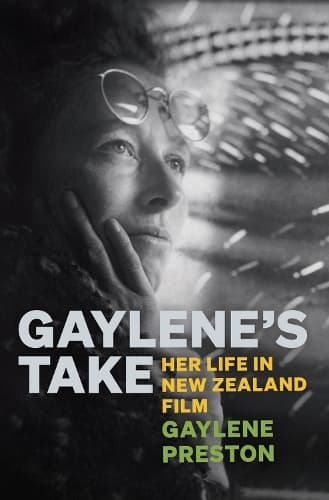Review: Gaylene’s Take: Her Life in New Zealand Film
Reviewed by primoz2500
There’s nothing like Dame - and this Dame is exceptional! What a delight to discover Gaylene Preston can tell stories on paper just as effectively as on film.
I’m an avid fiction reader and sometimes find non-fiction a chore. Not this book! I romped through it with intense pleasure, remembering Gaylene’s films and rejoicing in her quirky stories.
She begins with a poignant tribute to her rest home-residing mother Tui who has ‘rusty bones, rusty brain,’ capturing dementia in a few pertinent words, then going on to speak to her daughter Chelsie (the hugely talented and successful actor Chelsie Preston Crayford). The book is dedicated to Chelsie and to Preston's granddaughter Olive ‘before I forget it all.’ What a treat for us that she has not forgotten any of it.
We join her in Art School, in London, in Cannes, in boardrooms where men make the decisions (but male colleagues clearly have respect for Preston and she has many male friends, such as Alun Bollinger (AlBol) in the film industry). Being a skilled storyteller, she does not present her life to us chronologically. She takes us first to her work in psychiatric hospitals, in Christchurch and then in Cambridge, England. In more than one forward-thinking institution she was able to use her creative talents to help people explore their lives and feelings. She discovered the power of stories and the positive effects of being validated and seeing yourself on film.
She then takes us back to her childhood in Greymouth and Napier, and the hilarious story of hiding under the table, beneath women’s legs, doing her colouring-in while listening intently and trying to make sense of what she was hearing. Her mother would sometimes shoo her away because ‘her ears were flapping.’
Making sense of it all, telling stories that really matter and are important to Preston and has been her life’s work. Much of it was difficult, in a male-dominated profession, with New Zealand film not being taken seriously, funding running out and a multitude of complex issues to be dealt with.
Preston’s determination, refusal to toe the line and her marvellous sense of humour resulted in the making of many superb movies during the years: Ruby and Rata; Perfect Strangers; her documentary series Bread and Roses about the brilliant Sonja Davies; her father’s war experiences captured in Home by Christmas; her mother Tui’s stories, particularly about New Zealand women in WWII, resulting in the stunning documentary War Stories Our Mothers Never Told Us.
I was fascinated and dismayed to read of the difficulties that surrounded getting her first feature film Mr Wrong launched and into cinemas. It was a time in New Zealand when feminist awareness was growing and many women were attending Self-Defense classes run by Sue Lytollis. But male funders didn’t see the point of a funny film in which a terrorised woman prevails. Based on a story by Elizabeth Jane Howard, Gaylene wanted the film to ‘scare the pants off the punters while they were still laughing.’
After a court case, owing vast amounts of money and having been advised to find a man to join the production team, she climbs a stepladder in Courtney Place to replace the light bulbs outside the old cinema she has dared to hire for Mr Wrong’s premiere. At Cannes, later that year the New Zealand Film Commission signed deals for 67 territories, including the USA. Many years after first seeing it, I still remember whole scenes from this scary, funny, inspiring film, starring the brilliant curly-redhead Heather Bolton.
Preston’s feminism comes to the fore in her informative documentary My Year with Helen, in which she discovers and reveals that behind-the-scenes machinations will ensure that no women becomes the Director General of the United Nations, even one as talented and suitable as Helen Clark. I felt furious when I saw the film and furious again when I read about it in the book.
She has spent her life doing what she loves. ‘I love the thrill of sitting in a dark cinema with everyone looking in the same direction, reacting together. You get to know your film when you sit with it in an audience. That’s the buzz. Hearing people laugh, hearing when they choke up. The sound of sobbing is like angels singing.’
I relished the tone and informal style of this book. Preston speaks directly to the reader, sharing stories and difficulties and fun with us in her own lively voice. She writes with honesty, self-awareness and complete lack of ego. Her resilience and integrity shine though, as does her delicious humour.
If, after reading this marvellous book, you want to view a collection of her work, go to www.ngataonga.org.nz, to view the Dame Gaylene Preston Legacy Project.
Reviewed by Carole Beu
